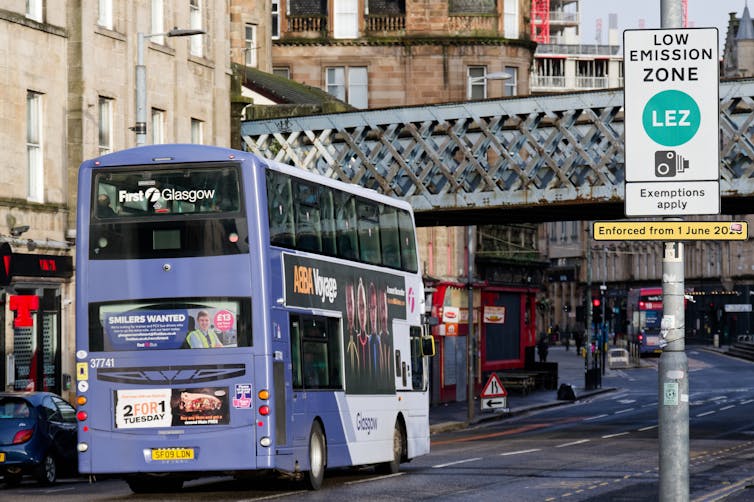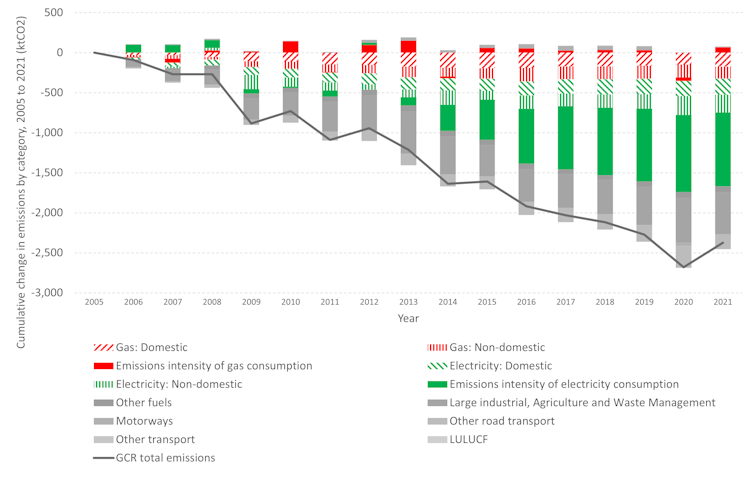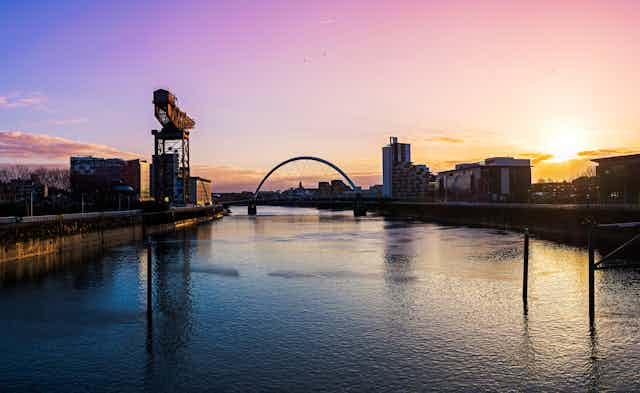More than two-thirds (67%) of the greenhouse gas emissions driving climate change originated in cities in 2020. It is not surprising, therefore, that mayors have joined national politicians in setting targets for reducing emissions within their jurisdictions.
Many UK cities have committed to achieving net zero ahead of the government target of 2050 (in Scotland, it is 2045). Manchester aims to be net zero by 2038, Liverpool and Birmingham by 2030. Nottingham expects to become the first carbon neutral city in the UK as early as 2028.
Are these pledges realistic? How much can cities and local councils actually do on their own to achieve net zero? A lot, certainly – but their capacity to cut emissions is constrained.
Drastically reducing urban emissions will require reform of sectors ranging from transport to electricity generation and home heating. Many of the policies capable of changing public behaviour, encouraging investment in new technology and restructuring the economy in order to do this, cannot be implemented by city hall.
Setting targets is one thing …
Ambitious targets provide a reference point, an expression of where we want to end up rather than a detailed road map for getting there. Setting a net zero target indicates a city is pulling in the same direction as national government.
But unrealistic targets, or failure to communicate the scale of coordinated and complex changes needed to achieve them, risk undermining confidence in the overall campaign, especially if progress turns out to be more complicated than was initially implied.
The UK prime minister, Rishi Sunak, recently tried to capitalise on the supposed disaffection with air pollution measures among voters in London by insisting his government’s plans to achieve net zero by 2050 won’t “unnecessarily give people more hassle and more costs in their lives”.
Read more: Net zero: Copenhagen's failure to meet its 2025 target casts doubt on other major climate plans
Policies may also falter if there is insufficient coordination between city planners, business leaders and politicians. In a recent paper, I looked at some of these issues in Glasgow with fellow researchers.

Glasgow is an interesting case, a Scottish city that can trace its large population and wealth to the industrial revolution – and the rich deposits of coal and iron ore it dug up to fuel heavy industries. The city suffered as a result of deindustrialisation. From relying on fossil fuels to support its development, Glasgow now seeks to be a leader in the green economy.
In 2019, Glasgow city set a target to be net zero by 2030. It aims to link this transition with the regeneration of the city through the Glasgow Green Deal, which has three objectives: reduce emissions and build resilience to environmental change, create jobs, and tackle poverty.
The latest data suggests emissions for Glasgow city fell 47% between 2005 and 2021. Significant progress, but much of this decline was driven by national efforts to decarbonise the electricity system; very little can be attributed to local policies.
Glasgow’s reduced emissions (2005-2021):

… Achieving them is another
Whatever cities say about their targets, their ability to dictate the pace and scale of the transition to net zero will be determined by the balance of power between national and regional policymakers.
Take transport, for example. Glasgow’s transport emissions comprised 28% of the city’s total emissions in 2021, with emissions from motorway traffic actually increasing in absolute terms from 2005.
Trunk roads – which carry nearly half the city’s traffic – are the responsibility of the devolved Scottish government in Edinburgh, while fuel taxes are decided by the UK government in London.
Responsibility for public transport is similarly mixed. The local rail network is overseen by the Scottish government-owned ScotRail, but bus regulation is the responsibility of the city council.
The city council can implement some localised road policies, including congestion charging and workplace parking levies. But clearly, without the cooperation of both the UK and Scottish governments, decisions made in Glasgow will not affect the bulk of the city’s emissions.
It’s also unclear how to count these emissions in the first place. Does a car journey taken by someone living nearby which passes through the city count towards Glasgow’s total? And what about emissions from businesses based in Glasgow that make goods consumed elsewhere?
International and domestic air travel (such as flights from Glasgow Airport) is a major source, but it’s not included among the emissions the city tracks or aims to eliminate.
Glasgow’s own estimate of its emissions, published annually, only reports these sources within unhelpfully broad categories.

What’s more, the multiple agencies involved in reaching net zero include businesses, community groups and nonprofits, many of which lie outside the authority of a city council. Figuring out where their capacity to cut emissions begins and ends, and predicting how any changes they make will affect other agencies and the achievement of other objectives, is complicated.
But Glasgow’s experience suggests cities can play a positive role in this process by convening local groups and asking them to focus their efforts on net zero. Targets are an important way of doing that, but the tougher work of managing and coordinating these efforts cannot be ignored. This is where the UK government’s recent backsliding on net zero is likely to have the biggest impact.

Don’t have time to read about climate change as much as you’d like?
Get a weekly roundup in your inbox instead. Every Wednesday, The Conversation’s environment editor writes Imagine, a short email that goes a little deeper into just one climate issue. Join the 20,000+ readers who’ve subscribed so far.

